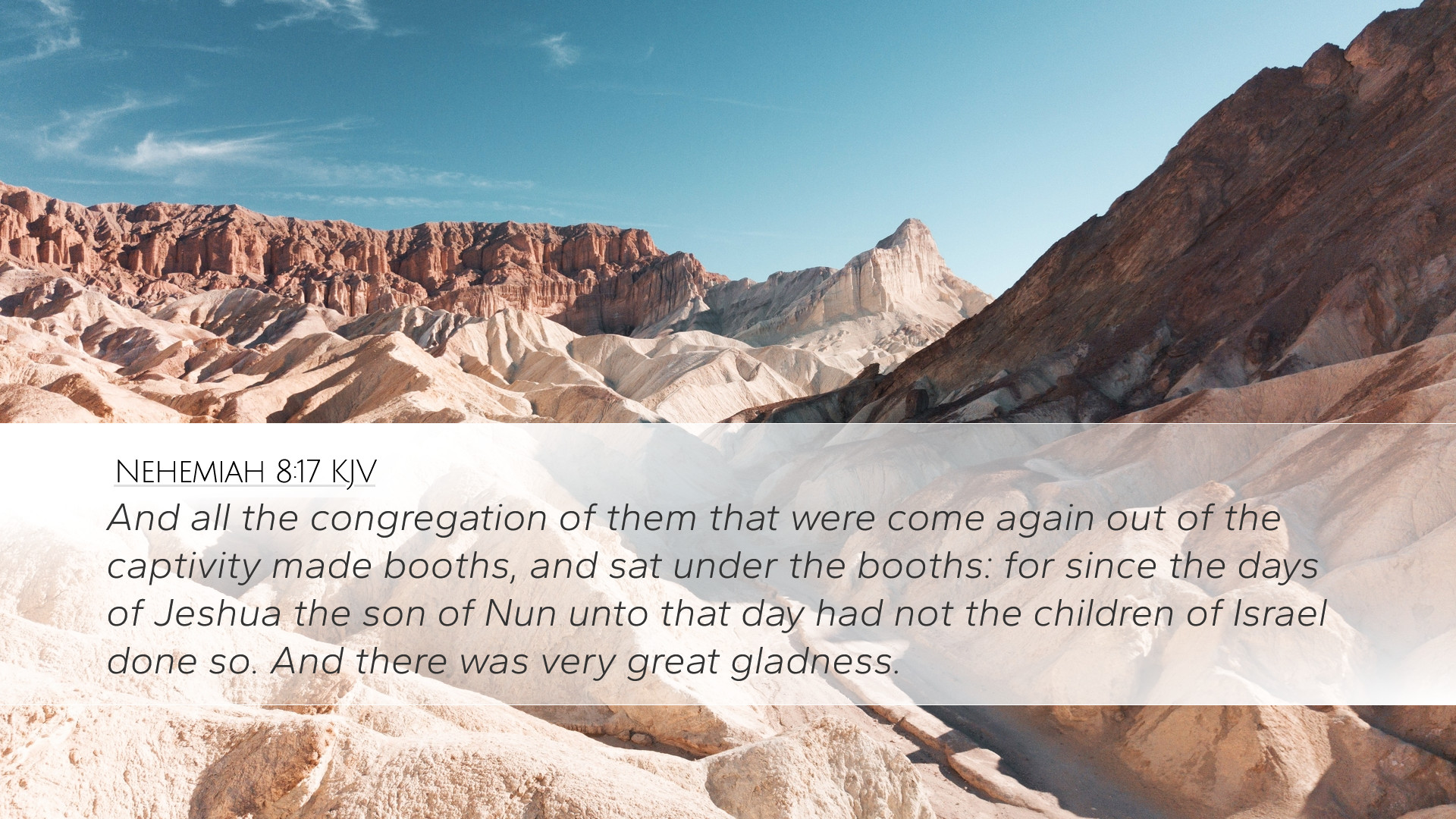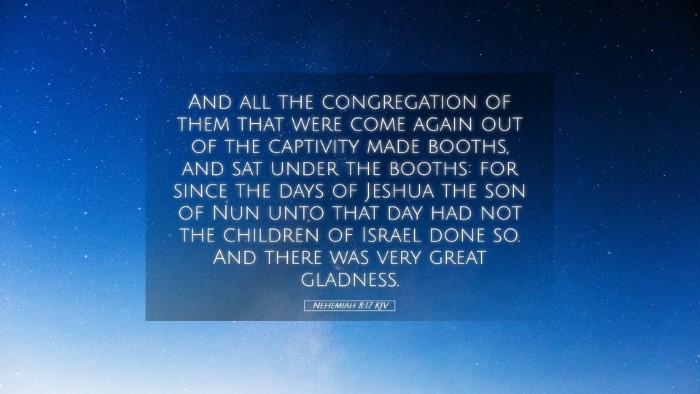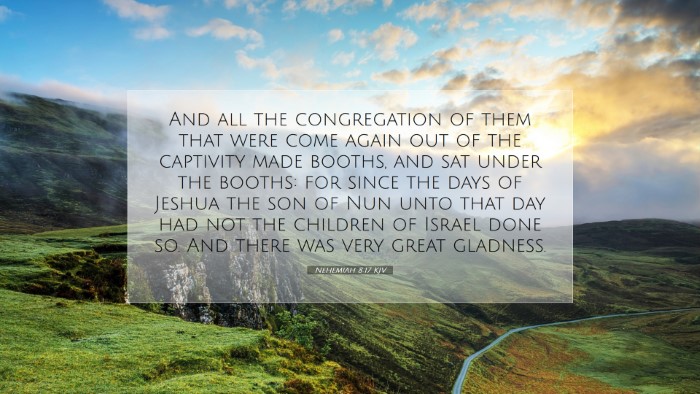Old Testament
Genesis Exodus Leviticus Numbers Deuteronomy Joshua Judges Ruth 1 Samuel 2 Samuel 1 Kings 2 Kings 1 Chronicles 2 Chronicles Ezra Nehemiah Esther Job Psalms Proverbs Ecclesiastes Song of Solomon Isaiah Jeremiah Lamentations Ezekiel Daniel Hosea Joel Amos Obadiah Jonah Micah Nahum Habakkuk Zephaniah Haggai Zechariah MalachiNehemiah 8:17
Nehemiah 8:17 KJV
And all the congregation of them that were come again out of the captivity made booths, and sat under the booths: for since the days of Jeshua the son of Nun unto that day had not the children of Israel done so. And there was very great gladness.
Nehemiah 8:17 Bible Commentary
Commentary on Nehemiah 8:17
Nehemiah 8:17 states, "And all the congregation of them that were come again out of the captivity made booths, and sat under the booths: for since the days of Jeshua the son of Nun unto that day had not the children of Israel done so. And there was very great gladness." This verse highlights a significant moment in Israel's history, marking the observance of the Feast of Tabernacles, a time of great joy and communal worship following their return from exile.
Historical Context
This passage is situated in the post-exilic period when the Israelites were returning from Babylonian captivity. The leadership of Nehemiah and Ezra was pivotal in restoring both the physical and spiritual life of the Jewish people. The rebuilding of the walls of Jerusalem under Nehemiah was interwoven with a reestablishment of the covenant community centered on God's law, as revitalized during the reading of the Scriptures.
The Significance of the Booths
The booths (or tabernacles) mentioned in this verse are representative of the Feast of Tabernacles (Sukkot), commanded in Leviticus 23:42-43, where Israelites were instructed to dwell in temporary shelters as a reminder of their ancestors' 40-year journey in the wilderness. This act served multiple purposes:
- Historical Remembrance: It reflects on the journey of the Israelites and God's provision during their time in the wilderness.
- Symbol of Dependence on God: The booths represent a physical embodiment of dependence upon God rather than material security.
- Communal Celebration: It fosters community spirit and unity among the Israelites, emphasizing collective worship and joy.
Commentatorial Insights
Matthew Henry's Perspective
Matthew Henry reflects on the deep significance of this reestablished festival. He notes that the gathering to celebrate the Feast of Tabernacles demonstrates the people's readiness to obey God's commandments once more. Henry points out that the joy felt during this festival was deeply rooted in their recollection of God's faithfulness throughout their tumultuous history.
Albert Barnes' Interpretation
Albert Barnes emphasizes that the great gladness felt by the people was unprecedented since the days of Jeshua (Joshua). He highlights the importance of communal joy in worship and its restorative power within the community. Barnes suggests that the joy in this context is both a celebration of liberation and a recommitment to God's laws, which serves as a foundation for social cohesion and spiritual integrity.
Adam Clarke's Contributions
Adam Clarke provides a detailed analysis of the cultural occurrence of the Feast of Tabernacles. He notes the unique aspect that this celebration had not been observed in such a significant manner since the times of Joshua. Clarke reflects upon the transformative effect that renewing this festival had on the Israelites, as it provided an opportunity for national pride and collective thanksgiving to God for His mercies. He further illustrates how this event was foundational for the communal identity of the Israelites as they came together in faith and tradition.
Theological Implications
Nehemiah 8:17 carries profound theological implications for understanding worship and community:
- Worship as a Community Activity: The act of coming together for worship during the Feast of Tabernacles underscores the importance of communal rather than just individual worship. The Church today can draw lessons on the need for communal worship that fosters joy and unity.
- God's Faithfulness: The observance of the booths reminds believers of God’s provision and faithfulness through difficult times. It encourages reflection on how past experiences shape present faith and collective identity.
- Renewal and Recommitment: The celebration signals a new chapter in Israel’s history, with a return to covenant faithfulness. This calls believers to recognize moments of renewal in their own lives and ministries.
Conclusion
Nehemiah 8:17 encapsulates a pivotal moment for the Israelites, marking a return to joyous worship and a recommitment to God’s laws. The historical and theological dimensions of this celebration provide rich insights for pastors and theologians seeking to underscore communal worship and the importance of remembering God's faithfulness in challenging times. As they engage with this text, they are encouraged to reflect on how such practices can be revitalized in their faith communities today.


